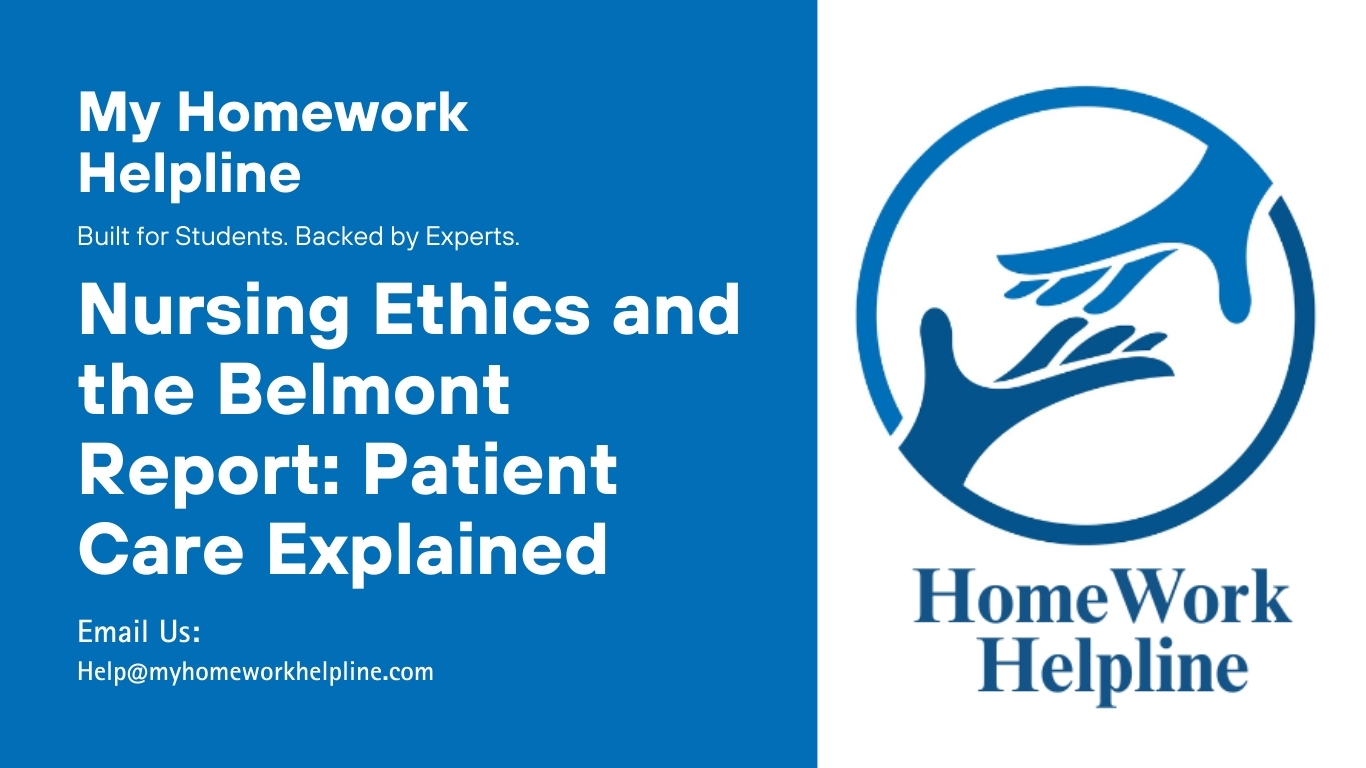Belmont Report and Nursing Ethics: Insights on Patient Care
1. What insights did you gain about a nurse’s role?
Nurses evaluate patients, take vital signs, give medication, and help with daily tasks. They help patients stay healthy, and also work with their families and doctors (U.S. Department of Health and Human Services, 2018). They let the medical staff know about patients’ requirements, issues, and advancements, guaranteeing coordinated and thorough care. Nurses work as their patients’ champions to ensure their rights and needs are upheld and satisfied. They are essential in fostering patient autonomy, supporting informed choices, and preserving patient welfare. Nurses uphold moral standards and champion patients’ rights and dignity. To ensure ethical behavior in research and clinical practice, they are directed by ethical codes and guidelines, such as the principles articulated in the Belmont Report
Struggling with a nursing assignment on ethics, patient care, or the Belmont Report? Our nursing homework assistance provides expert guidance for essays, research papers, and academic projects. Get professional support, step-by-step explanations, and insights on ethical decision-making in healthcare. Whether it’s a nursing ethics paper, patient care essay, or assignment on the Belmont Report, our team ensures timely, reliable, and high-quality homework help for students.
2. How does a nurse deal with conflicting opinions about research treatment between patient and family or patient and provider?
Nurses can struggle when patients, families, and healthcare providers disagree about research therapy. The nurse should listen to the patient, family, and doctor. This involves letting people voice their research therapy worries, anxieties, and choices. According to the U.S. Department of Health and Human Services (2018), listening attentively helps the nurse grasp others’ perspectives. The nurse can mediate to foster polite discussion. They can clear up misunderstandings and give everyone a chance to speak. Nurses should respect patients’ autonomy and healthcare decisions. They can help patients and their families understand treatment alternatives, including research treatments, and their risks and advantages. Informed consent lets patients decide. Nurses should know research treatment ethics. They can guarantee that research therapy respects ethical standards like the Belmont Report and protects patient rights and well-being
3. To whom is the nurse most accountable, the patient, the family, or the physician?
The nurse bears primary responsibility for the quality of their care delivery. In the wake of the Belmont Report, nurses must answer to their patients. The nurse is ethically responsible for safeguarding the patient’s health, independence, and legal rights (U.S. Department of Health and Human Services, 2018). They uphold the beneficence and primacy principles while acting in the patient’s best interests
4. How does a nurse balance these conflicting loyalties?
Nurses must apply nursing practices, listen, and determine priorities. Nurses may govern their loyalties by listening, communicating, defining priorities, and detecting ethical dilemmas. These skills help nurses prioritize patient care, handle ethical dilemmas, and engage with patients, colleagues, and authorities
4. How does the Code of Ethics for Nurses guide you in spur-of-the-moment decisions when a response is expected momentarily?
The Code of Ethics states that nurses must put patient safety first. Nurses should consider the patient’s interests and health when making quick choices. Patient autonomy and healthcare decision-making are stressed in the Code of Ethics. Nurses should consider the patient’s values, interests, and wishes when making snap decisions. They should consult the patient or follow their wishes wherever possible. Nurses should consider these principles when making snap choices to ensure they follow the code’s ethical guidelines. This encompasses secrecy, privacy, competent care, and informed consent.
5. What ideas did this learning exercise prompt in your thinking?
I have learned the worth of appreciating moral education. Problem-solving, communicating with patients, and recognizing bias benefit from understanding ethics and how to apply it. It gave me an excellent opportunity to reflect on how a nurse’s ethical training may serve her in a crisis. Understanding ethics is crucial to a nurse’s capacity to set priorities and make connections. The nurse may gently seek privacy for the patient and remind them of their right to autonomy if a patient faces challenges expressing their ideas when family members are present.
Reference
U.S. Department of Health and Human Services (2018). The Belmont Report: Basic Ethical Principles and their Application. https://youtu.be/M6AKIIhoFn4

